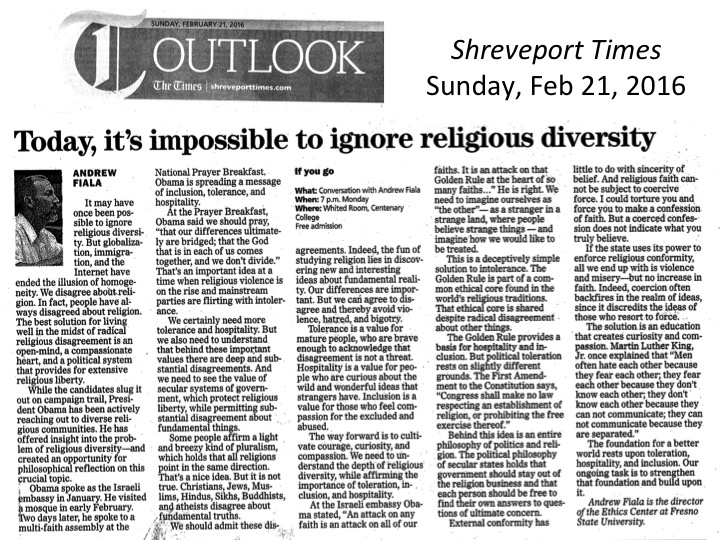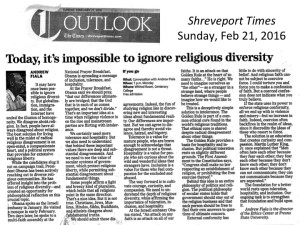Is charity a duty? Human Rights Day helps us realize the importance of extending hospitality to refugees
Fresno Bee, December 10, 2016
On Dec. 10, 1948, the United Nations adopted the Universal Declaration of Human Rights. The Human Rights Coalition of the Central Valley is commemorating Human Rights Day with an event at Fresno State focused on the rights of refugees.
Tens of millions of refugees roam the globe. California’s Central Valley often has been a place of refuge for those without a stable home. Our community includes Armenians, Hmong and others. Today we are welcoming Syrians.
Not every migrant is a refugee. Economic migrants seeking jobs are not refugees. Nor are criminals avoiding punishment. But women who fear genital mutilation are refugees, as are members of minority groups who fear slaughter and persecution.
Refugees are flung upon the mercy of the world. They are homeless strangers. What moral obligations do we have for them?
The U.N. Declaration of Human Rights asserts, “Everyone has the right to seek and to enjoy in other countries asylum from persecution.” It is wrong to force refugees back into countries where they are persecuted. Once offered asylum, refugees have the same rights as other immigrants. They should be free to speak, work and go to school.
EVERYONE HAS THE RIGHT TO SEEK AND TO ENJOY IN OTHER COUNTRIES ASYLUM FROM PERSECUTION.
U.N. Declaration of Human Rights
Two different ethical ideas guide our thinking here. A negative form of morality focuses on avoiding harm. But a more proactive morality calls for hospitality, compassion and love. These ideas apply in thinking about refugees and other cases: our treatment of the poor, the homeless and those in need.
Negative morality requires us to do no harm. On this view, it might be OK to close the door to a refugee, so long as you do so politely. It is immoral to pile more misery on the back of refugees. It is wrong to mock them, steal from them, exploit them or further persecute them. Negative morality views rights as protections – not as positive entitlements.
Hospitality goes further. It requires positive aid, compassion and care. This proactive ethic often is associated with Jesus, who explains it in the story of the Good Samaritan. It is not enough to avoid causing harm. We also ought to go the extra mile. Jesus says in the Sermon on the Mount, “Give to him who begs from you, and do not refuse him who would borrow from you.”
There are deep disagreements about whether proactive hospitality is morally required or whether it is something extra. Is charity a duty? Or is giving to the needy something saintly – nice but not necessary?
IS CHARITY A DUTY? OR IS GIVING TO THE NEEDY SOMETHING SAINTLY – NICE BUT NOT NECESSARY?
Certainly it is important to avoid harm. There would be fewer refugees if the countries of the world respected basic rights and just left people alone. But war, intolerance and hate continue to plague humankind.
In our hot, crowded and interconnected world, we are all neighbors. And the world’s moral traditions teach us to love our neighbors as ourselves. The ethic of love is proactive. It calls for caring action that goes beyond avoidance of harm. Victims of hate need our compassion. And homeless people need shelter from the storm.
And yet we wonder, “Who should help, and how much?” Perhaps those who are nearest have the greatest obligation to help. But it might be that those who have the most to give should give the most.
If help begins at home, then neighboring countries with a common culture ought to help local refugees. From this perspective, Arab and Islamic countries ought to help Syrian refugees, Asian countries ought to help Asian refugees, and so on.
Others will maintain that the richest countries ought to help the most, since they have the most to give. If you can help, you should: the greater your blessings, the greater your responsibilities.
Unfortunately, some people respond to the needy with fear and loathing. Some have argued that terrorists will sneak in along with refugees. Others worry that refugees will disrupt cultural homogeneity.
But fear is a poor guide for morality. Any time you invite a stranger into your home, there are dangers. But minor risks are outweighed by major needs. And let’s be honest, displaced children are not terrorists.
Respect for human rights is fundamental. Let’s avoid harm. But let’s also offer hospitality. We build a better world by loving our neighbors as ourselves.
http://www.fresnobee.com/living/liv-columns-blogs/andrew-fiala/article119974238.html





 While the candidates slug it out on campaign trail, President Obama has been actively reaching out to diverse religious communities. He has offered insight into the problem of religious diversity—and created an opportunity for philosophical reflection on this crucial topic.
While the candidates slug it out on campaign trail, President Obama has been actively reaching out to diverse religious communities. He has offered insight into the problem of religious diversity—and created an opportunity for philosophical reflection on this crucial topic.